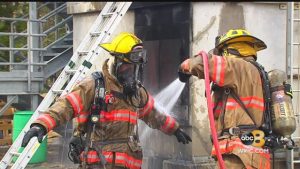
National Firefighter Safety Stand Down
Cancer in the Fire Service
Cancer awareness, prevention, and care is an important component of the overall wellness focus for firefighters. At Tampa Fire Rescue Occupational Health, we take a multi-faceted approach, to include:
- Prevention Strategies
- Medical Screening
- Early Access to Quality Care
- Support
PREVENTION STRATEGIES – PERSONAL
- Avoid tobacco products
- Smoking has been linked to various types of cancer — including cancer of the lung, mouth, throat, larynx, pancreas, bladder, cervix and kidney. Chewing tobacco has been linked to cancer of the oral cavity and pancreas. Even if you don’t use tobacco, exposure to secondhand smoke might increase your risk of lung cancer.
- Eat a healthy diet
- Although making healthy selections at the grocery store and at mealtime can’t guarantee cancer prevention, it might help reduce your risk. Consider these guidelines:
- Eat plenty of fruits and vegetables.Base your diet on fruits, vegetables and other foods from plant sources — such as whole grains and beans.
- Avoid obesity.Eat lighter and leaner by choosing fewer high-calorie foods, including refined sugars and fat from animal sources.
- If you choose to drink alcohol, do so in moderation.The risk of various types of cancer — including cancer of the breast, colon, lung, kidney and liver — increases with the amount of alcohol you drink and the length of time you’ve been drinking regularly.
- Limit processed meats.A report from the International Agency for Research on Cancer, the cancer agency of the World Health Organization, concluded that eating large amounts of processed meat can slightly increase the risk of certain types of cancer.
- In addition, women who eat a Mediterranean diet supplemented with extra-virgin olive oil and mixed nuts might have a reduced risk of breast cancer. The Mediterranean diet focuses on mostly on plant-based foods, such as fruits and vegetables, whole grains, legumes and nuts. People who follow the Mediterranean diet choose healthy fats, like olive oil, over butter and fish instead of red meat.
- Maintain a healthy weight and be physically active
- Maintaining a healthy weight might lower the risk of various types of cancer, including cancer of the breast, prostate, lung, colon and kidney.
- Physical activity counts, too. In addition to helping you control your weight, physical activity on its own might lower the risk of breast cancer and colon cancer.
- Adults who participate in any amount of physical activity gain some health benefits. But for substantial health benefits, strive to get at least 150 minutes a week of moderate aerobic activity or 75 minutes a week of vigorous aerobic physical activity. You can also do a combination of moderate and vigorous activity. As a general goal, include at least 30 minutes of physical activity in your daily routine — and if you can do more, even better.
- Protect yourself from the sun
- Skin cancer is the most common kinds of cancer in firefighters — and one of the most preventable. Try these tips:
- Avoid midday sun.Stay out of the sun between 10 a.m. and 4 p.m., when the sun’s rays are strongest.
- Stay in the shade.When you’re outdoors, stay in the shade as much as possible. Sunglasses and a broad-brimmed hat help, too.
- Cover exposed areas.Wear tightly woven, loose fitting clothing that covers as much of your skin as possible. Opt for bright or dark colors, which reflect more ultraviolet radiation than pastels or bleached cotton.
- Don’t skimp on sunscreen.Use generous amounts of sunscreen when you’re outdoors, and reapply often.
- Avoid tanning beds and sunlamps.These are just as damaging as natural sunlight.
- Get immunized
- Cancer prevention includes protection from certain viral infections. Talk to your doctor about immunization against:
- Hepatitis B.Hepatitis B can increase the risk of developing liver cancer.
- Human papillomavirus (HPV).HPV is a sexually transmitted virus that can lead to cervical and other genital cancers as well as squamous cell cancers of the head and neck. The HPV vaccine is recommended for girls and boys ages 11 and 12. It is also available to both men and women age 26 or younger who didn’t have the vaccine as adolescents.
- Perform regular self-exams
- Regular self-exams and screenings for various types of cancers — such as cancer of the skin, testicles, and breast — can increase your chances of discovering cancer early, when treatment is most likely to be successful. Ask your doctor about the best cancer screening schedule for you.
PREVENTION STRATEGIES – PROFESSIONAL – FOR FIRE RESCUE PERSONNEL
- Use SCBA from initial attack to finish of overhaul. (Not wearing SCBA in both active and post-fire environments is the most dangerous voluntary activity in the fire service today.)
- Do gross field decon of PPE to remove as much soot and particulates as
 possible.
possible. - Use decon wipes to remove as much soot as possible from head, neck, jaw, throat, under arms and hands immediately and while still on the scene.
- Change your clothes and wash them after a fire.
- Shower as soon as you are able to after a fire, to include washing your hair.
- Do not transport contaminated clothes or PPE in the cab of your vehicle.
- Keep bunker gear out of living and sleeping quarters.
- Use sunscreen or sun block.
STEPS TAMPA FIRE RESCUE OCCUPATIONAL HEALTH IS TAKING
- Annual physicals for all uniform personnel, to include: PSA and prostate exams for men 35 years of age and older, hemoccult testing for colon cancer, CA125 for all female firefighters, thyroid laboratory screening, comprehensive lab work, chest x-rays as needed, pulmonary function testing, physical exams.
- Decontamination wipes to be stocked on each apparatus for use at fire scenes.
- Education in health promotion and cancer prevention.
- Support for firefighters and their families post-diagnosis, to include: medical and counseling resources, information, contact networks.
Stay Safe,
Tiffany
Tiffany Kline, R.N., C.O.H.N.
Occupational Health Nurse Supervisor, Tampa Fire Rescue
City of Tampa / 116 S. 34th Street / Tampa, FL 33605
p: (813)242-5393 / c: (813)310-0736 / [email protected]

